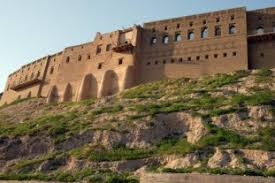A Message Concerning Damascus
49: 23-27
A message concerning Damascus DIG: Where is Damascus? In what state does Jeremiah see the cities of Syria? Who is behind the disaster? What have the Syrians done (Second Kings 8:7-12)? Is there any sign of mercy here? Why? Why not? What is the far eschatological future prophecy given by Isaiah about the destiny of Assyria?
REFLECT: Both Egypt and (Syria) Assyria were long time enemies of Judah and Isra’el. Both, however, will end up enjoying the joys of the thousand year Messianic Kingdom. Does that bother you or please you? How hard is it for you to forgive someone who has hurt you deeply? How hard is it to pray for those who oppress you?
Sometime between 604 and 601 BC
during the eleven-year reign of Jehoiakim
Concerning Damascus, which represents all of Syria, is now named among the Gentile nations under judgment from YHVH. Syria was often at war with Isra’el (Isaiah 7:1 to 8:4), but this conflicted relationship essentially stopped after the northern kingdom of Isra’el was conquered by Tiglath-Pileser of Assyria in 722 BC. At that point Syria, essentially became Assyria. Although Damascus/Syria is not listed among the doomed nations in 25:18-26, this oracle does have parallels in eighth-century prophetic writings (Isaiah 17:1-6). She was a constant enemy of Isra’el in that day. Her crime was brutality against the conquered people of Gilead, Isra’el’s territory east of Galilee (Amos 1:3-6). In addition, the Aramean armies joined Babylon in the assault on Jerusalem and Judah (Second Kings 24:2), resulting in the second deportation in 598 BC (to see link click Gt – In the Thirty-Seventh Year of the Exile Jehoiachin was Released from Prison).223
Three cities are named that refer to all of the kingdom: Damascus (the capital of the Aramean state directly north of Isra’el), Hamath and Arpad are all dismayed, for they all have heard bad news of Babylon’s advance. They are all disheartened, troubled like the restless sea. The great city and fortress of Damascus has become feeble, she has turned to flee and panic has gripped her; anguish and pain have seized her, pain like that of a woman in labor (49:23-24).
Why has the city of renown not been abandoned, the town in which I delight? Surely, her young men will fall in the streets; all her soldiers will be killed in that day, declares ADONAI-Tzva’ot (49:25-26). Her strength is gone; her glory has departed. The mood is not even one of threat, but only of grief, for the great city had been devastated. No one can withstand the resolve of Ha’Shem.

God’s fire of judgment: I will set fire to the walls of Damascus (see Ae – The Problem of Holy War in the TaNaKh); it will consume the fortresses of Ben-Hadad (49:27). Ben-Hadad, literally son the [the storm god] Hadad, was name of the dynasty that ruled in Damascus in the ninth and eighth centuries BC (First Kings 15:18 and 20, 20:1-34; Second Kings 6:24, 13:3 and 24), by which the Syrian royal house was more generally known.
While not mentioned here, we know from other Scriptures that Assyria will have a place in the Millennial Kingdom (see the commentary on Revelation Fk – Gentiles in the Messianic Kingdom). Ancient Assyria today encompasses northern Iraq, another ruthless enemy of Isra’el. But peace will come between Iraq and Isra’el by means of conversion (see the commentary on Isaiah Eg – Blessed Be Egypt, Assyria and Isra’el). There will be economic, religious and political unity because they will all worship the same God.



Leave A Comment